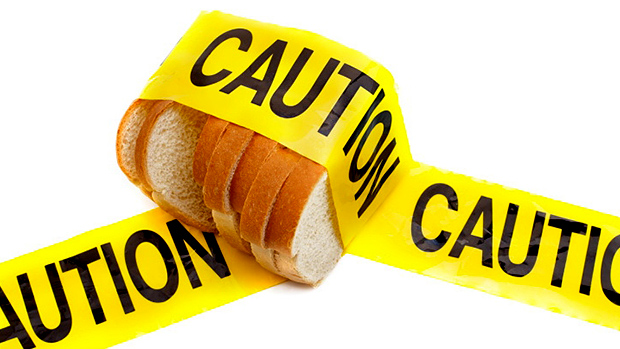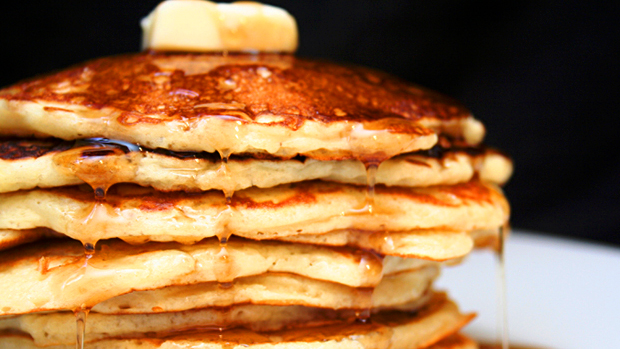To build muscle you need to eat, and eat a lot. The pundits say that what and how much you cram into your gullet accounts for 50% of your bodybuilding success, and for true hardgainers, even more.
This requires a dedicated approach to eating and a lot of planning – shopping, food prep, and let's not forget chewing. The most successful lifters look at this part of the process like a second job, a necessary step towards building a physique that gets second glances from both attractive women and envious gym rats.
But what if the very act of eating, even your favorite physique-friendly foods, became a battle more ferocious than your toughest leg day?
What if simply sitting down to a meal turned into a high stakes gamble – in 15 minutes would you be full and satiated or doubled-over in gut wrenching agony?
Growing up, I had serious stomach problems. I don't mean just mean cramps – I mean sleepless nights filled with agonizing pain and sweat-stained bed sheets.
I was young and desperately trying to put on muscle. I knew the importance of good nutrition and made sure I was eating all the typical bodybuilding foods: oatmeal, protein shakes, rice, cottage cheese, and even some milk.
Not only was this not working for me, I was in severe gastric pain 90% of the time.
I started going back and forth with a doctor. I was pleasantly treated to scopes, liquid chalk to drink, and proton inhibitors to kill my stomach acid. Despite these interventions, the doctors couldn't figure out what was wrong.
Frustrated, I decided to take things into my own hands.
It Started With Milk
Suspecting that I may be lactose intolerant, I cut out milk. I noticed an almost instant improvement in my gut health, however, it didn't completely rid me of my stomach problems.
So over the next few years, I went on an elimination diet and eventually determined what foods gave me the most problems. Interestingly, I later found these same foods were often responsible for giving many of my coaching clients problems as well. These foods were:
- Milk
- Cottage cheese
- Peanut butter
- Oats
- Most grains
- Most cheap flavored protein powders
- Bread/wheat
- Vegetable and canola oils
- Eggs (not as common)
While eliminating these foods certainly helped from a comfort perspective, it wasn't the final answer.
Remember, my goal was gaining muscle, which requires eating more food, not eliminating it. But for guys with stomach problems, eating more of even the "right" foods can be problematic.
Enter Intermittent Fasting (IF)
Intermittent fasting (IF) is an awesome tool to help "detox" the body after eating large quantities of food. I found that roughly following Martin Berkhan's now famous 16/8 fasting model (16 hour fast, 8 hour feed) was a very effective way to both pack in the calories while giving the body time to recover from large feedings.
There was still one problem. A short eating window requires much larger meals be consumed in a narrow window of opportunity. This can lead to digestion issues of its own if steps aren't taken to mitigate potential problems. This is where sauerkraut comes in.

Sauerkraut
I first discovered the powers of sauerkraut on a cheat day at an all-you-can eat restaurant. It was included with an appetizer, and not being one to waste food, I downed the sour, salty concoction with the rest of my gorge. I immediately noticed I was able to eat way more food and still feel great.
So I started experimenting on myself and clients by eating sauerkraut before every meal. The results were astounding. Everyone noted feeling much better and being able to eat way more food.
The magic at work is that fermented foods like sauerkraut are natural sources of probiotics, the "friendly" gut bacteria that helps optimize health and digestion by aiding intestinal bacteria in performing their tasks more efficiently. Fermented foods and other sources of probiotics quickly became a cornerstone in all my diet plans.
I'm on Acid
Stomach acid or hydrochloric acid (HCL) is essential for healthy digestion. In an earlier T Nation article, nutritionist Robert Yang says something that should get the attention of every hard training lifter:
"If you don't have enough HCL to convert pepsinogen to pepsin, then it doesn't matter if you eat 300 grams of protein, because you're hardly going to digest it all," says Yang.
To that end, every one should conduct the following experiment:
Get a bottle of HCL (Yang recommends one with pepsin in it).
- Take one capsule at the beginning of a meal.
- Eat the food.
- Assess how you feel after each meal.
- Keep taking one capsule at the beginning of each meal for two days.
According to Yang, a burning in your throat or stomach is a signal that your body produces enough HCL and you don't need to supplement with it. But if you don't feel a burning sensation, bump it up to two capsules before every meal for two days.
While you probably won't 'feel' anything, you'll likely notice less bloat, less gas, and less constipation. If you don't experience any of these effects after taking two capsules at the beginning of every meal for two days, go up to three and finally four capsules before each meal for two days.
That's as high as you should go, and continue on until you start to feel the burning sensation, whereupon you should start to titrate downward accordingly.
What about Protein Powder?
Quality protein shakes remain a staple in my muscle building diets, even for guys with stomach problems. However, quality matters. Many of the protein powders lining the big supplement store shelves are made of the cheapest ingredients and loaded with fillers – a veritable gut bomb for the digestively challenged.
As with most things in life, you get what you pay for. Only buy from brands you trust that offer a money back guarantee, especially if your gut happens to not approve.
Some truly sensitive individuals might require an unflavored protein. If these powders still cause cramps or discomfort then BCAAs and Leucine are your new muscle-building best friends. I've yet to encounter someone who has trouble with these amino acid supplements.

The Stomach Healing, Muscle Building Diet
Here's where things get exciting. Using the information above, we can construct a meal plan that when combined with a solid workout plan for the stomach-problem individual that will pack on slabs of lean mass.
Here's an example for a 180-pound man:
Morning
Fast throughout the morning. Drink plenty of water and/or green tea.
Workout
If it's a training day, work out before breaking your fast. Use an appropriate peri-workout nutrition protocol that doesn't bother your stomach and matches your goals.
Meal 1
Break your fast with 1/4 cup of fermented sauerkraut, and then eat:
- 1 pound meat
- 1-2 cups vegetables
- 1 tablespoon fish oil, or 2 Flameout®
Training Days: 1 pound potatoes (white or sweet)
Non-Training Day: 1/2 cup nuts (avoid peanuts and cashews)
Meal 2
Eat 1/4 cup of fermented sauerkraut and then eat:
- 1 pound meat
- 1-2 cups vegetables
- 1 tablespoon fish oil, or 2 Flameout®
Optional supplement: 3g Leucine
Training Days: 1/2 pound potatoes (white or sweet)
Non-Training Day: 1/2 cup nuts or 1-2 tablespoons oil (extra virgin olive oil or coconut oil) or 1/4 avocado
Meal 3
Eat 1/4 cup of fermented sauerkraut then either repeat Meal 2, or make the following protein shake:
- 5 scoops of protein with no fillers
- 2 tablespoons of nut butter (not cashew or peanut)
- 1 cup water
- 1/2 cup ice
- 1 cup frozen berries
- 1 cup of leafy greens or spinach (don't worry, you can't taste it)
- Stevia, if additional sweetener is needed
- Cocoa powder, cinnamon, and/or coconut flakes for flavor
Optional supplement: 3g Leucine
Obviously, the meal plan would be adjusted according to body size and body composition but you get the idea.
The Hardest Part
There's considerable talk recently of certain foods having almost addictive properties. I recently gave this eating plan to one of my clients, who told me, "Jason, trying to give up dairy products and bread is harder than when I quit smoking."
Consider this a warning – despite the almost magical improvements in digestion and quality of life, it's still very difficult for some to give up certain foods.
There is a silver lining, though – you'll be able to eat a ton of food, a bonus when the goal is to build a bigger, more muscular body. And what bodybuilder doesn't love sitting down to a big juicy steak?
If gut pain or poor digestion are making your muscle-building efforts a living hell, give the protocol listed in this article a shot. You have no idea how good life can be!




